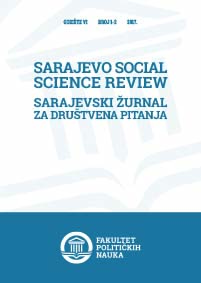Suvremena sociološka paradigma vojne organizacije – orijentacija prema vojnom pozivu ili orijentacija prema vojnoj službi kao zanimanju?
Contemporary sociological paradigm of military organisation – orientation to the military vocation or orientation to military service as a profession
Author(s): Dario Matika, Slavko BarićSubject(s): Sociology, Security and defense, Military policy
Published by: Fakultet političkih nauka - Univerzitet u Sarajevu
Keywords: social status; military culture; military organisation; job satisfaction;
Summary/Abstract: This article presents the results of research of sociological status (sociological paradigm) of members of the Croatian Armed Forces in the period before and after Croatia joined NATO as a full member, in the context of strengthening the organisational culture of the armed forces (military culture) as a set of values, beliefs and customs associated with the formal organisational structure producing norms of behaviour in the armed forces. The key starting point for the research was the theoretical assumption about organisational differences in value orientations, where the hypothesis of the study was that in the Croatian Armed Forces as a military organisation there are significant differences between members of the Air Force and Air Defence, Navy, Infantry, SF, Armoured Corps, Military Police and Artillery. A fragmented organisational perspective of the (military) culture was manifested through conservative and practical orientation towards work, where a stable working environment was preferred and where focus on achievement and tendency for risk-taking (in average terms) were not expressed. Overall job satisfaction was satisfactory; however, it should be noted that members of the Air Force and Air Defence were statistically more oriented towards military service as a profession and not as a military vocation. It is the authors’ opinion that the solution lies in harmonisation (harmony between management and command) and a new understanding of diversity as a means and instrument for improving efficiency in managing and leading military organisations as a component of military culture.
Journal: Sarajevski žurnal za društvena pitanja
- Issue Year: VI/2017
- Issue No: 1-2
- Page Range: 175-196
- Page Count: 22
- Language: Croatian

